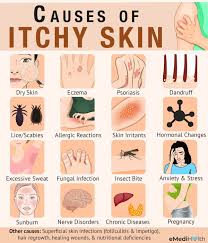Itchy skin, medically known as pruritus, is a common problem that can be frustrating and uncomfortable. It can be a temporary annoyance or a sign of an underlying condition. Understanding the causes, remedies, and prevention techniques can help you find relief and keep your skin healthy.
Common Causes of Itchy Skin
Itchy skin can stem from various factors, including environmental, medical, and lifestyle-related reasons. Here are some of the most common causes:
1. Dry Skin (Xerosis)
When the skin lacks moisture, it becomes dry and itchy. This is common in colder months or due to excessive bathing with harsh soaps.
Symptoms:
- Flaky or scaly skin
- Rough texture
- Tight feeling
Remedies:
- Use a gentle moisturizer
- Avoid hot showers
- Drink plenty of water
2. Allergies
Allergic reactions from foods, pollen, pet dander, or skincare products can trigger itching.
Symptoms:
- Red, inflamed skin
- Rash or hives
- Swelling
Remedies:
- Identify and avoid allergens
- Take antihistamines if necessary
- Use hypoallergenic skincare products
3. Skin Conditions
Chronic skin conditions like eczema, psoriasis, and dermatitis often cause persistent itching.
Symptoms:
- Red, irritated patches
- Scaling or peeling skin
- Frequent flare-ups
Remedies:
- Use medicated creams prescribed by a doctor
- Keep the skin hydrated
- Avoid harsh chemicals
4. Insect Bites
Mosquitoes, bedbugs, and fleas can cause localized itching due to their bites.
Symptoms:
- Small, red, itchy bumps
- Clusters of bites
- Swelling or blistering in severe cases
Remedies:
- Apply calamine lotion or hydrocortisone cream
- Avoid scratching to prevent infection
- Use insect repellent
5. Fungal or Bacterial Infections
Fungal infections like athlete’s foot and bacterial infections like impetigo can cause itching.
Symptoms:
- Redness and inflammation
- Peeling or cracking skin
- Pain or burning sensation
Remedies:
- Use antifungal or antibacterial treatments
- Keep the affected area clean and dry
- Wear breathable fabrics
6. Stress and Anxiety
Mental health can impact physical symptoms, including itchy skin.
Symptoms:
- No visible rash
- Worsening with stress
- General discomfort
Remedies:
- Practice relaxation techniques like yoga or meditation
- Engage in stress-reducing activities
- Maintain a proper sleep schedule
7. Underlying Medical Conditions
Diseases like liver disease, kidney disease, and diabetes can cause systemic itching.
Symptoms:
- Persistent itching without a rash
- The itching worsens at night
- Other health complications
Remedies:
- Consult a doctor for a proper diagnosis
- Manage the underlying condition
- Follow a healthy lifestyle
Best Remedies for Itchy Skin
If you’re dealing with itchy skin, try these effective home remedies and treatments:
1. Moisturize Regularly
Applying a fragrance-free moisturizer helps restore the skin’s barrier and reduces dryness-related itching.
2. Take Cool Showers
Hot water can strip the skin of natural oils, worsening the itch. Use lukewarm water and mild soap.
3. Apply Aloe Vera
Aloe vera has anti-inflammatory properties that soothe irritation and redness.
4. Use Oatmeal Baths
Colloidal oatmeal helps calm inflammation and provides relief from itching.
5. Wear Loose, Breathable Fabrics
Tight clothing can worsen irritation. Opt for cotton or other soft fabrics.
6. Avoid Scratching
Scratching worsens the itch and can lead to infections. Keep your nails trimmed to minimize damage.
7. Try Over-the-Counter Medications
Antihistamines, hydrocortisone creams, and calamine lotion can provide relief for minor itching.
Preventing Itchy Skin
Preventing involves simple lifestyle adjustments. Here’s how to minimize the risk:
1. Stay Hydrated
Drink plenty of water to maintain skin hydration from within.
2. Use Gentle Skincare Products
Avoid harsh chemicals, alcohol-based toners, and heavily fragranced lotions.
3. Keep Indoor Air Moist
Use a humidifier to prevent dry air from affecting your skin.
4. Maintain a Healthy Diet
Eat foods rich in vitamins A, C, and E to promote skin health.
5. Manage Stress
Engage in activities that help reduce stress and anxiety to prevent flare-ups.
6. Protect Your Skin from the Sun
Wear sunscreen to prevent UV damage, which can contribute to dryness and irritation.
When to See a Doctor
If itching persists for more than two weeks, or if it’s accompanied by severe symptoms like swelling, pain, or infection, consult a doctor. You may need prescription medications or further medical evaluation.
Conclusion
Itchy skin can be bothersome, but understanding the causes and remedies can help you find relief. Simple lifestyle changes, home remedies, and proper skin care can keep your skin comfortable and healthy. If the problem persists, seek medical advice to rule out any serious conditions.






